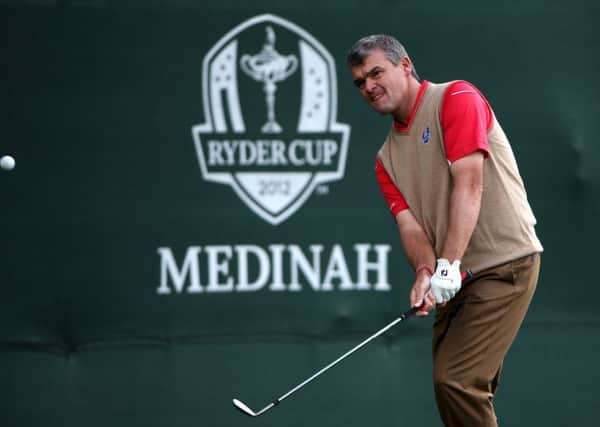Ryder Cup: Beware the Hazeltine cauldron, warns Paul Lawrie


“The only Ryder Cup I know as a player, having made my two appearances away from home, is the one these boys are going to face, and I think that was one of the reasons that Darren [Clarke] asked me to be a vice-captain,” said the Aberdonian of a role he is filling for the first time at Hazeltine this week.
It is different – much different – to when he was put on the spot by Colin Montgomerie on the first tee in Massachusetts 17 years ago or found himself going head-to-head with Brandt Snedeker, the newly-crowned FedEx Cup winner at the time, on the last day on the outskirts of Chicago in 2012. He’s relishing the task with equal vigour, though, and aims to draw on both those past experiences to help Clarke in his bid to try and steer Europe to an unprecedented fourth win in a row.
Advertisement
Hide AdAdvertisement
Hide Ad“The feeling of excitement going into this Ryder Cup is totally different to my playing appearances,” added the Aberdonian as he arrived in Minnesota along with compatriot Sam Torrance, the 2002 winning captain who has also been enlisted by Clarke this week after being one of Paul McGinley’s right-hand men, too, at Gleneagles two years ago.
“Going into the Ryder Cup as a player, there’s a bit of pressure on you knowing that you are going to have to step up to the plate and perform. As a vice-captain, it is taken out of your hands, to be honest. There is very little you can do. All you can do is chat to the players and help prepare them the best you can by passing on your experience.
“Obviously there are players on the team [Lee Westwood is making his tenth successive appearance] who have way more experience than me when it comes to the Ryder Cup, but there are also a lot of young players and rookies who the vice-captains can help.”
It’s unlikely that one of those six newcomers will find themselves in the position Lawrie did on the first morning on his debut, but, no matter when they are blooded by captain Clarke, pictured inset, the Scot says it will be a cauldron they’ve never experienced before and will be telling them there is only one way to silence a partisan home crowd.
“The hardest thing I found first time was how against you they are and you have to try and cope and deal with that,” said the 47-year-old. “A Ryder Cup away from home is more of a football crowd-type of atmosphere. There’s a lot of noise and a lot of goings on. I was at Gleneagles as a spectator for half a day two years ago and it was obviously loud and noisy. But I definitely think playing away from home is that much harder.
“There were incidents in both the matches I played in that were over the top and the only way to deal with it is by making birdies [as Lawrie certainly did as he produced some of the best golf on a dramatic last day at Medinah to beat Snedeker 5&3 as Europe came from four points behind to win 14.5-13.5].
“That’s the only way you can quieten them. So the younger guys I’ve spoken to, all I’ve tried to pass on is that. But you’ve got to enjoy it. You can’t go out there feeling pressure or feeling tight. You’ve got to love it as you will not have a better experience in your life than the Ryder Cup.”
That was certainly the case for those on the winning team four years ago, when Europe looked dead and buried until Ian Poulter birdied the last five holes on the Saturday afternoon to give the visitors some much-needed momentum heading into the singles. The rest, as they say, is history.
Advertisement
Hide AdAdvertisement
Hide Ad“It was the shortest team meeting of the week on the Saturday night,” recalled Lawrie of the speech delivered by Jose Maria Olazabal at an event where Europe used Seve Ballesteros as their inspiration following his death the previous year. “Having seen the line-up for the next day, every single player left that meeting believing that we could turn it round on the Sunday.
“When it unfolded the way it did, it was still a monumental and unbelievable achievement. But, after Poulter and Rory [McIlroy] had won the last game on the Saturday night to get us back within four points, the whole team room changed and I assume the talk Jose Maria gave changed, too, because if we’d lost those two games to go 12-4 down, there’s no way in the world we could come back.
“I went to bed on the Saturday night believing I could win my match. I’d played well all week and putted poorly. But I found something on the putting green on the Saturday night. Darren Clarke [a vice-captain on that occasion] gave me bit of a lesson and I putted for about 40 minutes and knew I was going to play well on the Sunday.